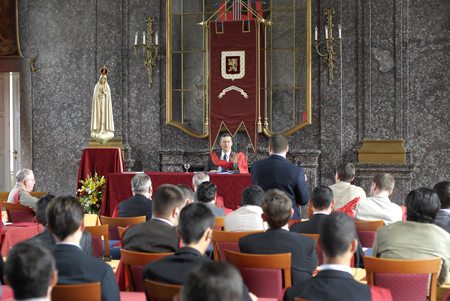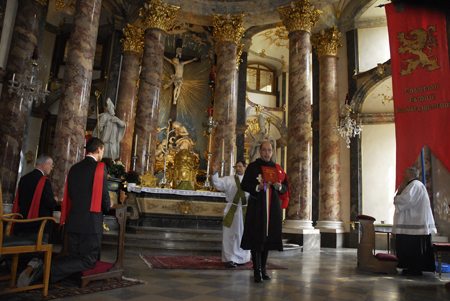
“We all came here form different places but we are united,” commented one Slovakian conservative at the closing banquet of the 2009 International Student Conference.
This sense of unity would seem very hard to imagine to the superficial observer who would see people from such diverse places speaking so many different languages. Delegations came from Austria, Germany, the United States, Poland, Brazil, Italy, Peru, Slovakia, and other nations. However, for the nearly 100 participants these differences were secondary.
The course was held from July 14-20 at the stately eighteenth-century Lowenstein Castle in the wooden Bavarian hills in Kleinheubach, Germany. It was the project of the Tradition Family Property (TFP) organizations in France, Austria and Germany. This year’s theme was: “Catholic Principles to Counter the Multiform Crisis of the Modern World.” It especially commemorated the fiftieth anniversary of the publication of the book, Revolution and Counter-Revolution by Plinio Corrêa de Oliveira. “We all came here from different places but we are united,” commented one Slovakian conservative at the closing banquet of the 2009 International Student Conference.
Timely Talks
Perhaps it was the unity of thought of this great book that accounted for the unity of the participants. Its penetrating insight and analysis is the reason why it is the bedside book of TFP members and the prism through which they see the world crisis.
The talks at the “Summer University” reflected this unity and density of thought. So many timely aspects of the world crisis were presented in a manner, which could be applied to the diverse activities of the attendees.
There were talks about history like that of Mr. Mario Navarro da Costa of the TFP Washington Bureau who spoke about the Revolution and Counter-revolutionary movements before World War I.
Another talk was by Mr. Nelson Fragelli who spoke about the Cultural Revolution found in everyday life. He spoke of the role of tendencies and ambiences in this great fight and a very controversial analysis of our “jeans” culture.
German TFP president Mathias von Gersdorff discussed a matter on everyone’s mind: the homosexual revolution. It did not matter where the attendees were from, all spoke of the overwhelming pressure to impose same sex “marriage” on people who do not want it.
Mr. Jose Ureta discussed what Prof. Plinio Corrêa de Oliveira called the Fourth Revolution – today’s cultural revolution. He gave an impressive look at the digital and cybernetic aspects of this revolution.
Messrs. Julio Loredo and Renzo Alvares Astengo gave an overview of the rise of socialist dictatorships in Latin America such as Hugo Chavez, Evo Morales and others. They showed the amazing unity of tactics used to impose their systems on the area’s conservative populations.
Other topics included the Revolution in the economy and its counter-revolutionary alternative.

Study workshops followed the talks as participants had the opportunity to ask questions about most talks, discuss them and apply them to concrete reality. There was also plenty of other opportunity to discuss the meetings over a cup of coffee or a glass of good Bavarian beer.
Most importantly, participants prayed together. Daily mass was part of the program as well as final night prayers in the chapel. Solemn sung Masses also marked the occasion.
And then there was action. American TFP member Michael Drake gave a presentation on the diverse activities of the American TFP encouraging all to get involved in this great struggle for Christian civilization. He especially highlighted the campaigns against same-sex “marriage” and the over 3,000 public square rosaries held in October of 2008.
Final Day
At any Summer Conference, the final day is the climax of the program. Duke Paul of Oldenburg of the German TFP gave a magnificent presentation on “The Role of True Devotion to Mary According to Saint Louis Marie Grignion de Montfort in the Life and Combat of a Catholic Wishing to Become a Counter-Revolutionary.” He was followed in the afternoon by Prince Bertrand of Orleans-Braganza who spoke about the methods of action inspired by Revolution and Counter-Revolution
The two speeches were a fitting summary of an intense week. The final banquet was the final expression of those who were different yet united. However, it was not just a pleasant week of studies, it was an invitation to engage in the struggle for Christian civilization in light of the principles of Revolution and Counter-Revolution.
At the final banquet in the majestic ballroom, representatives of the national delegations delivered speeches and testimonials. Diplomas and presents were distributed. All were reminded that this conference was but a preparation for the fight ahead.

